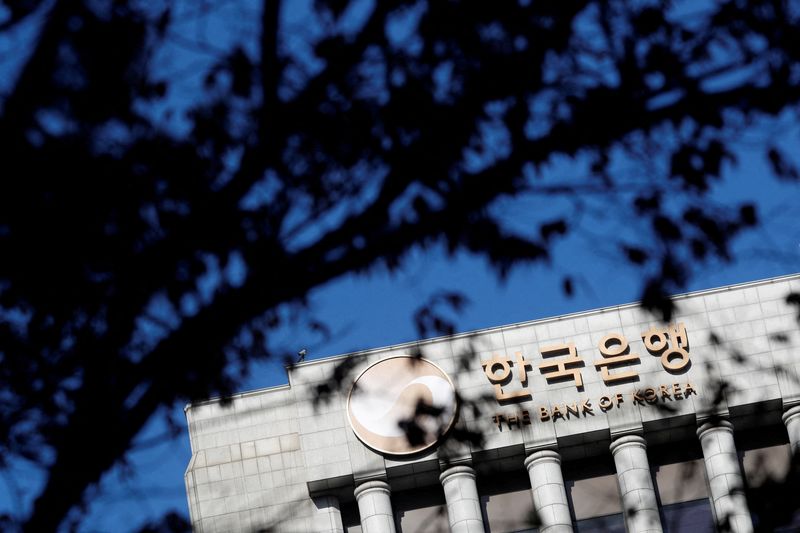BENGALURU (Reuters) – The Bank of Korea will cut its key interest rate by 25 basis points to 3.25% on Friday, according to a majority of economists polled by Reuters who expect that to be the only reduction this year as it attempts to balance growth and financial stability.
Inflation eased rapidly to 1.6% in September from 2% in August, the lowest since early 2021 and below the Bank of Korea’s (BOK) medium-term target of 2%. Since its last meeting in August, the central bank has shifted its focus to economic growth, which unexpectedly contracted last quarter.
However, the BOK is likely to proceed cautiously when cutting rates as growth in household debt and a heated property market pose risks to financial stability.
All but three of 37 economists polled Oct. 1-7 forecast the central bank would cut its base rate by 25 basis points on Oct. 11, bringing rates to 3.25%. The rest said no change.
If realised, the BOK will join Asian peers Bank Indonesia and the Philippine central bank which began cutting rates before the U.S. Federal Reserve started its own easing campaign with a 50 basis point cut last month.
Suktae Oh, chief Korea economist at Societe Generale (OTC:SCGLY), said the Fed’s large rate cut and South Korea’s growth and inflation data supported the case for a BOK rate cut this month, but added that further cuts in the near term were unlikely.
“Persistent concerns around the housing market will make it difficult for policymakers to explicitly propose an additional rate cut in the near future, in other words, this would reduce the likelihood of a back-to-back rate cut in November,” he said.
Among economists who provided a forecast for year-end around 84%, or 27 of 32, said 3.25%. Five predicted one more 25 basis point rate cut. This outlook was largely unchanged from an August survey and in line with market expectations.
Poll data showed the BOK will cut rates more slowly than some of its regional peers, with a total of 50 basis points of cuts next year, taking rates to 2.75% by end-2025.
“We are expecting the BOK to end the year at 3.25%, followed by two more 25bp cuts in 2025 to 2.75%…and is likely to take a breather there,” said Kelvin Lam, senior economist at Pantheon Macroeconomics.
“However, the BOK may speed up or slow down the pace of cuts depending on external factors, since they do not want the Korean won to fluctuate or depreciate too much.”
Following the U.S. Fed’s September rate cut and expectations for two more this quarter, the Korean won has gained around 4% after touching its weakest level so far this year in mid-April.
Korea’s economic growth will improve this year, averaging 2.4% from 1.4% last year, before slowing to 2.1% in 2025, poll medians showed.




